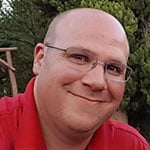Links to share:
Dr. Kevin Stein and Dr. Matt Barton's 2019 article "I'm sorry you interpreted my behavior the way you did: Toward a new understanding of the nuances of mortification," published in Western Journal of Communication: https://drive.google.com/file/d/1x0b0m26U7YMt_kpKH...
TED Talk on Lance Armstrong's Apologia: https://drive.google.com/file/d/0B1mqW5xCIuA9WnFFT...
Guest Appearance on X96 radio (Salt Lake) Discussing Apologia in the News (with Dr. Matt Barton): https://drive.google.com/file/d/1x0b0m26U7YMt_kpKH...
Which class(es) do you teach online?
Communication & Professional Development, Qualitative Research Methods, and Pop Culture & Communication
What do you want students in your courses to learn? What is the learning outcome or objective?
I would like my students to learn the basic theories and research methods in our field and to apply those skills in professional communication industries. I always tell them that when they leave our program they should be masters in the construction and critical analysis of messages, whether they be in public relations, journalism, politics, business or wherever.
Why did you start teaching?
I started teaching because I wanted to mentor other students the way I was mentored. I had some amazing teachers in both of my graduate programs who have become lifelong friends and collaborators. They persuaded me, with great difficulty at first, that I was smart enough and driven enough to advance this far in my education. I'm on the hunt for students who are better than they think they are, and I really want to help them succeed.
What advice would you give to those considering this program?
I would tell students that if they performed well in their bachelor's programs, they probably have the intellectual chops to do well in a master's program. It's all about buckling down and diligently doing your readings and completing course assignments. I'm also a big proponent of civility in everyday life, so I encourage students to be respectful to each other, their professors and themselves. I throw in that last part because people can often be unnecessarily hard on themselves when they have minor struggles.
What qualities make someone particularly successful in the field in which you teach?
I once saw a survey of Fortune 500 Company CEOs who were asked which qualities they were looking for in graduating students. The first three were critical-thinking skills, interpersonal skills and problem-solving skills. Number 4 was knowledge of their field. I found this shocking, but the data is really telling. It teaches us that we shouldn't just focus on learning the material. We need to hone those soft skills that will allow us to really shine.
What do you think is the biggest challenge that people in the profession face today?
The biggest challenge is probably the stigma that all of the liberal arts are useless in our society. The reality is that our discipline creates well-rounded people who can do just about anything. However, this breadth of knowledge can create challenges as outgoing students don't always know which industries or specific companies they want to work in. I try to assure our students that most, if not all, do find their place and are happy and productive members of the workforce.
What is the one book you think everyone should read?
Man's Search for Meaning by Viktor Frankl
Tell us something interesting about yourself that your students might not know.
I went skydiving four times in a single day when I was 18 years old, and I've eaten scorpions.
